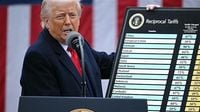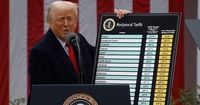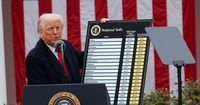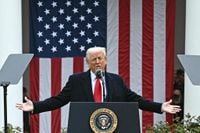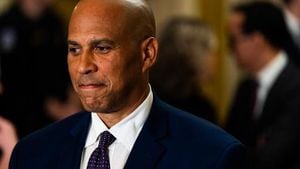On April 2, 2025, American President Donald Trump ignited a trade war by implementing a series of global import duties, a move that has sent shockwaves through international markets and raised concerns about the future of the global economy. Dubbed 'Liberation Day' by Trump, the announcement included reciprocal tariffs aimed at countries that have previously imposed their own import duties on American products.
The new measures involve a basic levy of 10 percent on all goods entering the United States, although the European Union (EU) faces a significantly higher levy of 20 percent. This escalation in trade tensions is expected to exacerbate existing economic challenges, with many analysts predicting negative repercussions for both American consumers and global trade relations.
According to the White House, the tariffs will take effect at midnight local time on April 3, 2025, which is 06:00 Dutch time. The move is part of a broader strategy by Trump to combat what he describes as unfair trade practices that have harmed American industries. "This is the day America becomes rich again," Trump proclaimed during his announcement.
However, the tariffs are not limited to the EU. Countries outside of Europe are also facing steep import duties: goods from the United Kingdom will incur a 10 percent tariff, while Chinese goods will see a staggering 34 percent levy. South Korea will face a 25 percent tariff, India 26 percent, Switzerland 31 percent, Taiwan 32 percent, and Vietnam a hefty 46 percent.
The backdrop to these tariffs is a series of retaliatory measures taken by other nations in response to previous American trade policies, including existing tariffs on steel, aluminum, and automobiles. The EU has already announced its own import duties on American goods valued at 26 billion euros, signaling a readiness to engage in tit-for-tat measures.
Democratic leaders in the U.S. have expressed strong opposition to Trump's approach, arguing that the tariffs will ultimately hurt the American economy. Hakeem Jeffries, the Democratic leader in the House of Representatives, criticized the administration's policies, stating, "This is not Liberation Day, but rather Recession Day." He accused Trump and the Republicans of failing to address rising living costs, which they had promised to tackle during the campaign.
In the wake of the announcement, international trading partners have been gearing up for countermeasures. Ursula von der Leyen, the President of the European Commission, voiced her concerns about the potential fallout from the tariffs. She stated, "Import duties will only drive inflation higher, and this will cost jobs." Von der Leyen emphasized that while the EU is open to negotiations with the U.S., it is also prepared to respond decisively if necessary. "Let me be clear, Europe did not start this confrontation. We do not wish to retaliate, but we have a strong plan ready to go if needed," she warned.
As markets reacted negatively to the announcement, stock prices tumbled, reflecting investor fears about the implications of a prolonged trade war. Analysts are closely monitoring the situation, as the potential for escalating tariffs could lead to a downturn in global economic growth.
In summary, the launch of these import duties marks a significant escalation in the ongoing trade tensions between the United States and its international partners. With both sides preparing for potential retaliation, the global economy stands at a precarious crossroads, raising questions about the future of free trade and economic cooperation.
